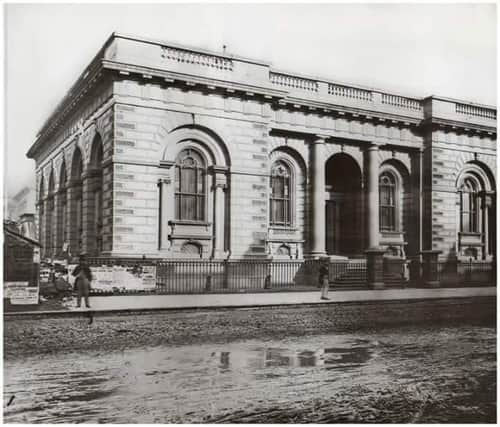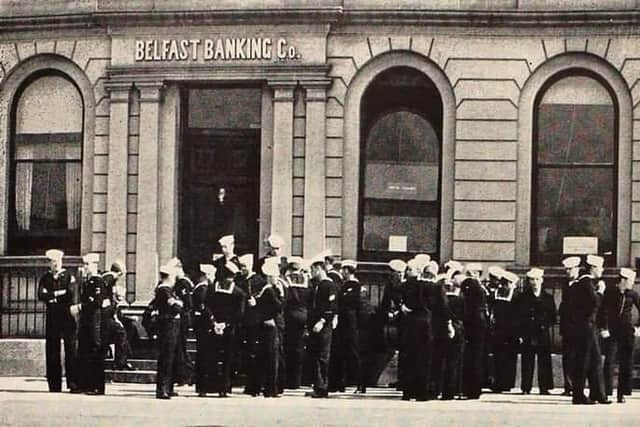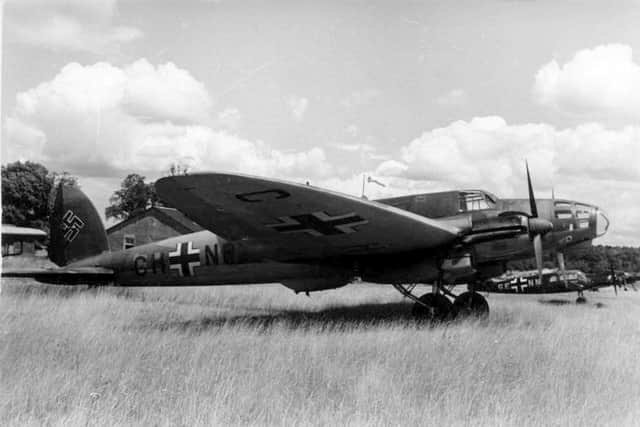Even during the war-time Blitz, money made the world go round


After a single reconnaissance flight in November 1940, the first raid by eight German bombers on 7/8 April 1941 was led by a pathfinder Heinkel 111.
A large group of German aircraft returned on the evening of Easter Tuesday, April 15 and by the end of the third raid on May 4-5 over 1,000 Belfast folk were dead and half of the city’s houses, along with industrial and commercial buildings, were destroyed.
Advertisement
Hide AdAdvertisement
Hide AdLike today’s Covid-19 pandemic, that tragic tally of death was accompanied by unimaginably colossal economic challenges.


How did Belfast’s financial institutions cope?
Gavin Bamford Chair of History Hub Ulster, is a retired Assistant Manager of the Northern Bank.
He’s sharing a wartime account here today, written by the late Ned Dyas, former Manager of the Northern Bank’s Foreign Department, which had its Head Office in Victoria Street, Belfast.
Published in June 1993 for the bank’s in-house magazine called The Link, Mr Dyas’s article begins with an exterior photograph of the Head Office.


Advertisement
Hide AdAdvertisement
Hide AdBehind the two tall windows left of the main door, secretaries clacked old-fashioned typewriters and spoke on telephones with separate earpieces.
Standing, or perched on high stools, clerks logged financial transactions on enormous ledgers spread along a high solid desk stretching the length of the room.
The manager reigned from a large, imposing desk.
Even though it was in the target area near the shipyard, the Northern Bank, and most other city banks, fortunately escaped any major damage during the blitz.
But it wasn’t completely immune.
“A solitary incendiary bomb left a hole in the floor of the stationery store,” Ned Dyas recounted, “and I remember having to step over this hole to get at our supplies.”
Advertisement
Hide AdAdvertisement
Hide AdHe also noted “one of the cupboards held bundles and bundles of Reichsmark banknotes dating from the collapse of the mark in the twenties.”
Although fire-watching was a chore, it was a source of much needed extra remuneration for ‘office juniors’.
Particularly if they lived in digs, some staff worked as many nights as possible - at the rate three shillings (15p) per night (much more valuable back then) - though luckier staff working overtime for a director or chief cashier earned up to 7/6d a night!
They cycled to the office, arriving for fire-watching about 10 pm and slept in the main waiting room or Foreign Department on temporarily-assembled beds.
Advertisement
Hide AdAdvertisement
Hide AdIn the morning they cycled home for breakfast, and back to the office again “in good time for a day’s work!”
Late arrivals for fire-watching made a prior arrangements to be let in at a side door.
“Quite often the pulley-bell on the great front door would clang out in the darkness to announce a late-comer,” Mr Dyas recounted, “and I can remember on occasions seeing the face of the Albert Clock showing midnight as I made my way down to the side door.”
The Northern Bank was first to operate a foreign currency department, appointed by the Government as its agent to deal with the U.S. Forces.
Advertisement
Hide AdAdvertisement
Hide AdSo the Victoria Street Cash Office was frequently packed with U.S. Navy personnel when their vessels docked in Belfast and “the boys needed cash for the weekend,” Ned Dyas recalled.
“On pay day”, he added, “the steps on either side of the main door at Head Office were lined by U.S troops with rifles at the ready” all the way from their bullion van in the street to the cash counter inside.
The bank also received “dozens of cables each day from the States to make payments to individual U.S. Army personnel at camps all over NI. As many as 150 to 200 were despatched daily to personnel.”
There was also an ‘unofficial arrangement’ for the bank to cash GIs’ and US sailors’ cheques, with only a very occasional ‘dud’ causing problems!
Advertisement
Hide AdAdvertisement
Hide AdMr Dyas remembered the counterfeits, sometimes written “on ordinary sheets of paper shaped like a cheque (which were) returned by our agents, not with ‘Refer to Drawer’ or ‘Insufficient Funds’ but with the ultimate answer ‘No such bank!’”
Admitting that his memories of wartime banking were bathed “in a rosy glow” Mr Dyas reminisced “banks of those days were very much large families. And as in all families there were the lighter moments!”
Naming some old acquaintances he recalled duets sung “in the Letter Department in the morning, interrupted by Bank Secretary, Hugh Murphy, a man of imposing stature but gentle in manner, asking with a broad smile when the opera was beginning.
Incidentally, it was Mr. Murphy’s dictum that if you walked round the office with a bundle of papers under your arm no one would ever ask you to do anything!
Advertisement
Hide AdAdvertisement
Hide Ad“To conclude, our small staff of eight or nine in the Foreign Department was kept at full stretch during this time but there was very much a family feel about all we did and to someone like myself (and, if I may include him, John Tunstead) coming from Dublin to Belfast and not knowing a soul, it was good to find oneself among so many friends, and so soon.”
Thank you Gavin Bamford of historyhubulster.co.uk for contributing former Manager Ned Dyas’s wonderfully vivid recollections of the Northern Bank and the Blitz.
A message from the Editor:
Thank you for reading this story on our website. While I have your attention, I also have an important request to make of you.
In order for us to continue to provide high quality and trusted local news on this free-to-read site, I am asking you to also please purchase a copy of our newspaper whenever you are able to do so.
Advertisement
Hide AdAdvertisement
Hide AdOur journalists are highly trained and our content is independently regulated by IPSO to some of the most rigorous standards in the world. But being your eyes and ears comes at a price. So we need your support more than ever to buy our newspapers during this crisis.
With the coronavirus lockdown having a major impact on many of our local valued advertisers - and consequently the advertising that we receive - we are more reliant than ever on you helping us to provide you with news and information by buying a copy of our newspaper when you can safely.
You can also enjoy unlimited access to the best news from across Northern Ireland and the UK by subscribing to newsletter.co.uk
With a digital subscription, you can read more than five articles, see fewer ads, enjoy faster load times, and get access to exclusive newsletters and content. Visit https://www.newsletter.co.uk/subscriptions now to sign up.
Thank you